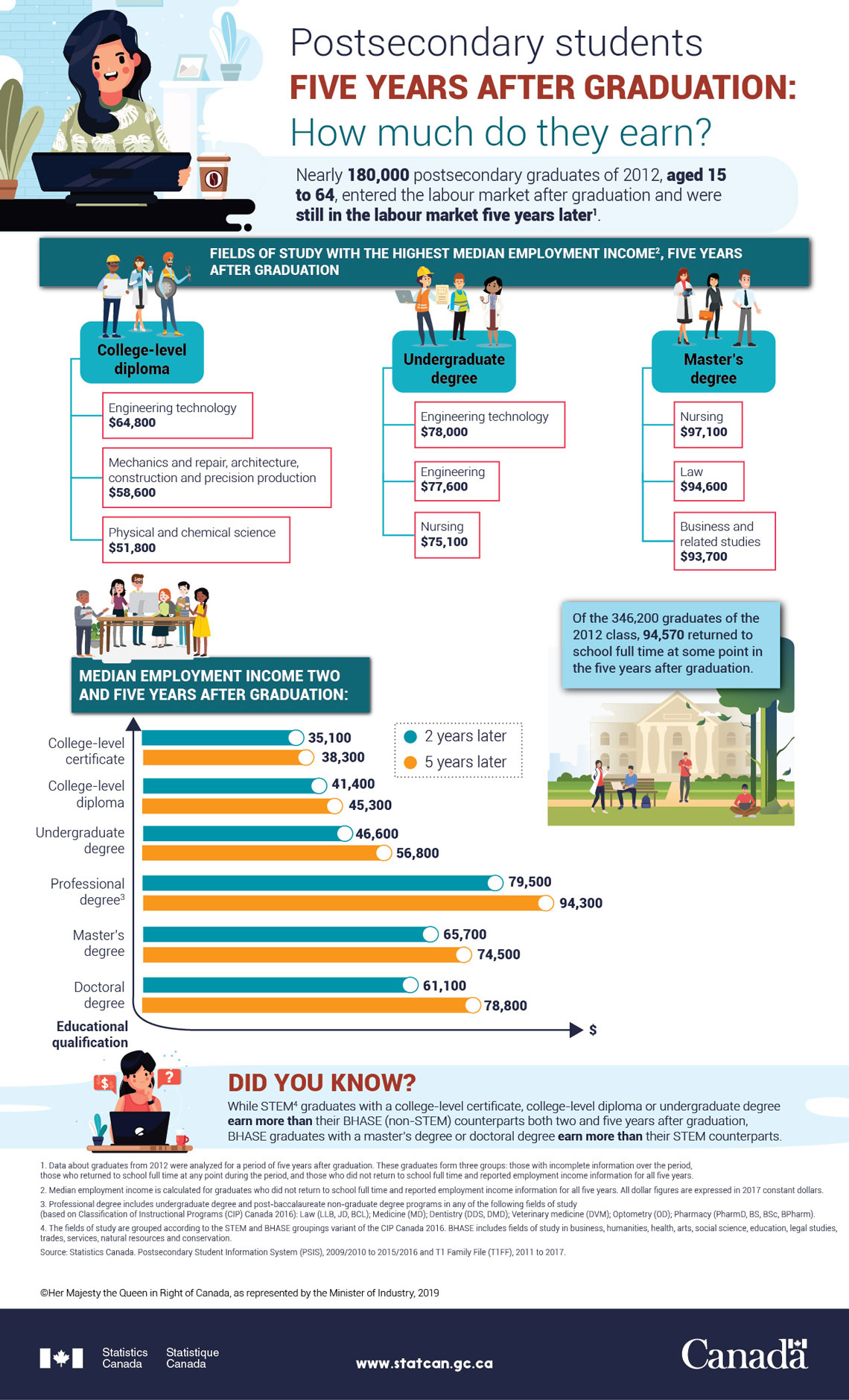Why grad school?
Why consider a graduate degree?
Graduate degrees open doors and are sought-after assets in the labour market. An increasing number of employers are hiring employees with master’s degrees for positions previously only requiring a bachelor degree. The Canadian Association for Graduate Studies (CAGS) notes that graduate degrees are a valuable asset for a growing number of jobs.
Not surprisingly, Statistics Canada confirms the clearest benefit of a graduate education: higher employment rates are associated with higher levels of education. Master’s degree holders earn a larger premium over those with a bachelor’s degree. The infographic below from Statistics Canada demonstrates median employment income five and five years after graduation based on educational qualification. Labour market outcomes show that master and doctorate graduates are the most likely to obtain a job they had hoped for after graduation. Moreover, higher levels of education are associated with better health, more giving back to society, and general happiness overall.

There are other advantages to completing a graduate degree that you might not have considered:
- Professional development: new skills and competencies and higher levels of expertise
- Personal growth: finding a new community of scholars, independent research, intensive learning environments, greater collaboration with faculty
- International recognition in your area of study or profession
Learn more about what motivated our students and alumni to enroll in graduate programs at Memorial.

What are my options?
Memorial University offers three main types of graduate credentials. Graduate diploma programs are offered in the Marine Institute and Faculties of Humanities and Social Sciences, Engineering and Applied Science, Medicine, Nursing, Education, Business Administration. Graduate diplomas are graduate programs and typically have 3 to 5 courses as program requirements. They can normally be completed in one year of full-time study.
Master’s degree programs are offered in all Faculties, Schools, and campuses. There are generally two types of master’s degrees: one focused on research and requiring students to complete some coursework and a thesis, and the other focused on professional development requiring coursework only (10 to 20 courses) or a combination or coursework and a project or paper. Master’s programs can generally be completed in one to two years of full-time study.
Research master’s degree programs (and some professional master’s programs) can prepare you for a doctoral degree program, for which you are expected to produce original, meaningful research in your field of study. Doctoral programs are offered in all Faculties, Schools, and campuses. Doctoral students are required to defend their thesis prior to award of degree. Doctoral degree programs can generally be completed in four years of full-time study.
Students enrolled in research-intensive graduate programs are assigned a faculty member to supervise, mentor, and guide their research projects to completion. Prospective students are strongly encouraged to identify on their applications and contact by email potential supervisors to ensure they make an informed decision on the type of research they undertake.

Am I eligible?
Admission requirements vary by program. Generally speaking, graduate diploma and related master’s programs have the same minimum admission requirements. Master’s applicants must have completed (or be expected to complete) an undergraduate degree in a related field. Doctoral applicants must have completed (or be expected to complete) a master’s degree in a related field. In some exceptional cases, a student may be admitted directly to a doctoral program from an undergraduate degree or be allowed to transfer from a master’s program to a doctoral program.
The minimum grade requirements can vary, but to be competitive you should have a mid-B average or better in your current or prior degree program. For research programs, graduate applicants may have to additionally meet the minimum requirements for SGS fellowships to be admissible. Some professional master’s programs require work experience and/or a minimum score in a standardized test (e.g., GMAT, GRE). Applicants who did not previously study in English may be required to achieve a minimum score in an English proficiency test (e.g., IELTS, TOEFL).
While minimum academic requirements apply to all graduate programs, and admission into many graduate programs are competitive, graduate applicants are assessed holistically. Your work experience, life experience, and non-academic achievements are all considered along with your transcripts. The online application also allows prospective graduate students to explain any special circumstances that might contextualize their academic history.

What will it cost?
Finances are an important factor for you when considering graduate school. At Memorial, graduate tuition rates are among the lowest in Canada. Graduate program fees are charged in regular installments regardless of the number of courses you take. It’s also important to remember that for research programs, funding packages are offered to all eligible students. Funding packages draw from three major sources: School of Graduate Studies fellowships, supervisor grants, and graduate assistantships (employment). There’s no need to apply for funding separately – you’re automatically considered when you apply for admission to a research program.
I’m interested – what’s next?
Considering and applying to graduate school can be a daunting task for many, but we’re here to help. The School of Graduate Studies and our 60 academic units across all of Memorial’s campuses are committed to making the graduate admission process as clear and seamless for you as possible.
We offer a number of video tutorials on how to apply, request reference letters, and draft a statement of purpose. Our weekly webinar series and information sessions also provide more details on graduate programs, the application process, online learning for part-time students, and funding opportunities. Finally, our dedicated team of professional staff are available to answer any question you might have within one business day.
With over 100 graduate degree programs and courses at Memorial University, you're sure to find the right fit for you.